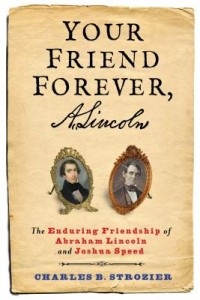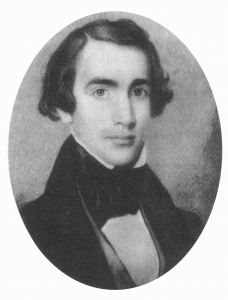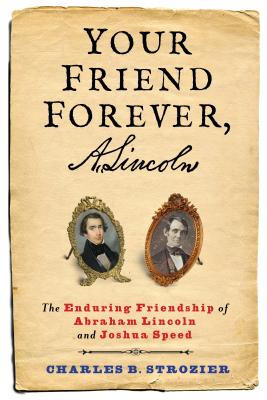 Your Friend Forever, A. Lincoln: The Enduring Friendship of Abraham Lincoln and Joshua Speed
Your Friend Forever, A. Lincoln: The Enduring Friendship of Abraham Lincoln and Joshua Speed
by Charles B. Strozier
Columbia. 352 pages, $35.
IN 1982, Charles B. Strozier published an influential psychoanalytic study of Abraham Lincoln’s personal life, Lincoln’s Quest for Union: Public and Private Meanings. One chapter focused on Joshua Speed, by authoritative accounts Lincoln’s most intimate friend. Strozier created a stir among scholars with conclusions about Speed’s role in a much-debated episode, Lincoln’s nervous breakdown in 1841. Most historians had attributed it to his failed courtship of Mary Todd. Strozier came up with a startling new explanation. He argued that the breakdown resulted from Joshua Speed’s decision to end his companionship with Lincoln, which had included sharing the same bed for nearly four years. In fact, it was the loss of Speed, Strozier concluded, that undid Lincoln’s marriage plans with Mary Todd. “This separation apparently threw Lincoln into a panic that shook his fragile sexual identity. In this state his fear of intimacy with a woman was revived, and he broke his engagement with Mary.”
Strozier didn’t assert that Lincoln and Speed were sexual partners, but he reinvigorated controversy about Lincoln’s mysterious love life, long a subject of dispute among biographers. Gay historians had already speculated about a Lincoln-Speed love affair. Strozier’s analysis expanded the bed-sharing angle, giving it the aura of evidence. Many scholars found the idea preposterous, pointing out that same-sex bed sharing was commonplace in the 19th century. People with no romantic or sexual affiliation routinely slept together at inns and private homes. It was a matter of necessity because mattresses were expensive and scarce.
But Strozier provided reasons to challenge that explanation. “Lincoln,” he wrote in Lincoln’s Quest for Union, “was sensitive to issues of male closeness in a way that distinguished him from his peers.” To illustrate the point, Strozier quoted a poem Lincoln wrote at age nineteen about two teenage boys who marry, have sex, and to their surprise cannot produce a baby. It was a satirical poem, written to embarrass someone against whom Lincoln held a grudge. What did the homosexual theme signify? Strozier flagged Lincoln’s “fragile sexual identity,” emphasizing that his “conflicts and fears operated at an unconscious level. He was only dimly aware of his conflicts as he struggled to define his identity.”

Unconscious or not, these conflicts suggested homosexual tendencies. However, Strozier was more interested in the implications for Lincoln’s relations with women. Of the bed-sharing with Speed he wrote: “It is probable that such close male contact during the years of Lincoln’s greatest heterosexual tension heightened the difficulty he found in securing intimacy with women. … Their intimate maleness substituted for the tantalizing but frightening closeness of women.” Strozier concluded that it all worked out for the best. Speed provided Lincoln with “a mirror of his own inner experience,” and vice versa. The bed became a zone of trust. In it, Lincoln’s psyche overlapped with Speed’s. It could hardly be described as a routine sleeping arrangement, but Lincoln and Speed never consummated it sexually. They didn’t go all the way.
Not so fast, said various writers. Way back in 1926, Carl Sandburg had used unmistakably coded language in his claim that both Lincoln and Speed possessed a “streak of lavender … spots soft as May violets.” In the 1970s, on the eve of Strozier’s book, the insurgent gay press had been circulating the gay Lincoln idea. Indeed, Lincoln and Speed were shaping up as an iconic gay couple. How could Strozier be sure that they were not, in fact, sexual lovers?
Strozier didn’t directly address the question in Lincoln’s Quest for Union. Over time he issued some notable claims, most conspicuously in a book by the eminent Harvard historian and Lincoln biographer David Herbert Donald. In his final major work, 2003’s “We Are Lincoln Men”: Abraham Lincoln and His Friends, Donald quoted Strozier’s reasons for doubting a sexual love affair between Lincoln and Speed. It couldn’t have happened, according to Strozier, because it would have made Lincoln “a bisexual at best, torn between worlds, full of shame, confused, and hardly likely to end up in politics.”
In 2005, the late C. A. Tripp’s The Intimate World of Abraham Lincoln created a mild furor with the thesis that Speed was the romantic and sexual love of Lincoln’s life. (I assisted Dr. Tripp with this project.) Strozier reviewed Tripp’s book for The Illinois Times. In the course of noting his disagreements with Tripp’s findings, he advised readers to “consider the telling psychological picture we have of Lincoln, who hardly presented as homosexual.” This reasoning raised questions. What is the evidence for homosexual shame in 19th-century political life? How did you “present as a homosexual” in the 19th century? Strozier seemed to be projecting 20th-century concepts onto an era when such concepts hadn’t yet evolved.
The debate over Lincoln’s sexuality provoked sharp reactions among academics, a subject I discussed in these pages (see “Lincoln, Sex, and the Scholars,” March-April 2006). As far as I know, most of the writers in question haven’t revisited their assessments. Strozier now proves an exception with a new book from Columbia University Press: Your Friend Forever, A. Lincoln: The Enduring Friendship of Abraham Lincoln and Joshua Speed.
IN HIS NEW BOOK, Strozier expands his case that Lincoln was heterosexual, arguing that the prejudices of the time would have doomed a gay Lincoln to failure in public life. Put simply, Lincoln couldn’t have been gay because he was successful. That seems a rather dour way to look at the matter. But it deserves consideration.
The new book also expands the theme of intimacy. “Desire lurked in forbidden realms,” Strozier declares, suggesting a gateway to carnality just beyond the bed. Lincoln and Speed experienced each other “as not really separate and independent but as another who completed himself, someone necessary for a cohesive sense of well-being.” Lincoln’s connection to Mary Todd didn’t run this deep. Indeed, Lincoln saw Mary as Speed in disguise. “Mary was merely the vicarious screen on which Lincoln’s desire was projected.” It is noteworthy that the self-completion theme suggests romantic love.
In the main Strozier describes a kind of years-long psychological therapy session. Unresolved issues had slowed Lincoln’s emotional development. Speed complicated the challenge, to the point of precipitating Lincoln’s nervous breakdown—but then Speed rescued Lincoln from the breakdown. It is with this rescue theme that Strozier most strikingly departs from his earlier biography: “In a very real sense, Speed saved his life and made it possible for him to realize his potential and make a mark that would live on the pages of history.”
It’s important to know that during the height of this crisis only one person aside from Speed observed Lincoln closely, a doctor named Anson Henry. Unfortunately for history, Henry decided to keep his mouth shut about what he learned, despite reports that Lincoln confided to him things he’d never before disclosed to anyone. That leaves Speed as the sole firsthand witness of Lincoln’s rescue. We don’t have many specific details about Speed’s role, apart from the familiar detail that he removed blades from Lincoln’s reach. But we do have Speed’s public diagnosis of Lincoln’s problem. It was the version that went down in history: Lincoln fell apart because he had jilted Mary Todd. Untrue, according to both Strozier and Tripp. The actual problem was Speed’s decision to leave Lincoln.
The rescue played out for just over a year and ended with sudden finality in February, 1842. Lincoln received an urgent letter from Speed about his wedding to an attractive young woman named Fanny. Both Lincoln and Speed had dreaded the prospect of mandatory wedding-night sex with wives. Speed confided that events with Fanny had gone well enough. However, he added that he still felt haunted by “something indescribably horrible and alarming.” Shortly after reading this, Lincoln wrote back to Speed: “I opened the letter, with intense anxiety and trepidation—so much, that although it turned out better than I expected, I have hardly yet, at the distance of ten hours, become calm.”
These beautiful lines from Speed and Lincoln have a deathless quality, like classic camp. Nobody, of course, knows what they mean. Strozier thinks that when Lincoln read the news that Speed and Fanny had consummated their marriage, he symbolically shared their moment of union. “The climax came with Speed’s actual marriage and, more importantly, the great moment of its consummation. That raised Lincoln into a high state of anxiety. Lincoln involves himself as a shadow self in Speed’s bed there with Fanny.” Evidently, Speed’s sexual intercourse with his wife on their marriage night opened a door in Lincoln’s head, revealing a path to his own union with a woman. According to Strozier, February 25, 1842, “marked the turning point in what had been up to that point the crippled emotional life of Abraham Lincoln. Everything after that changed—and almost entirely for the good.”
It seems like a miracle cure at Lourdes. Of course, Strozier could be right. The fascinating thing is that his descriptions of Lincoln and Speed’s intimacy—the knack these two men had for completing each other—evokes a gay love affair. It’s almost like a gay soap opera. This raises the question, why didn’t anyone notice that it was Speed who precipitated Lincoln’s nervous breakdown? It must have been obvious to some observers that Lincoln had collapsed not because he had left Mary but because Speed had left him. But was it obvious?
The record shows no trace of anyone recalling that it was the loss of Speed that made Lincoln suicidal. In fact, until Strozier published on the subject in 1982, no mainstream historian had ever come to that conclusion. This was Strozier’s major contribution, and also his argument’s key weakness. Why hadn’t historians found any stories that Lincoln was fixated on Speed? The same weakness applies to the gay Lincoln thesis. Contemporary witnesses didn’t recall seeing a love affair with Speed.
But there’s another way to look at it. Jean Baker, Mary Lincoln’s preeminent biographer, has suggested that homosexuality in the 19th century might have “hidden in plain sight.” Thanks to Strozier, we have fresh reason to think that this was so. If Speed’s instigation of Lincoln’s suicidal nervous breakdown could hide in plain sight, then a gay love affair between Lincoln and Speed could do the same.
Strozier well describes Lincoln’s sense of disintegration when he learned that Speed was leaving. He felt incapacitated because his other half was detaching, taking a walk from the bed and out of state. These are the feelings of a person who has been dumped. It’s the desperation, as C. A. Tripp put it, that comes “not when one has dropped a lover, but when one has himself been dropped in a love affair, and thus lacks the leverage to repair the situation.” Why did Speed do it? Interestingly, Strozier doesn’t speculate. Neither did Tripp. It’s a mystery. Perhaps it’s related to the “indescribably horrible and alarming” thing that Speed found so haunting.
I think Strozier plots the big picture this way. Lincoln’s attractions to Speed will harm Lincoln, and maybe even kill him. Speed saves the day with great news about his wedding night. This cures Lincoln of his obsession with Speed, allowing it to be transferred to the rightful person, the neglected Mary Todd. Speed has cured Lincoln of being gay.
Strozier declares that “there is no direct evidence to prove that the Lincoln-Speed relationship was sexualized, or was known as sexualized, witnessed as such, or talked about as homosexual by any contemporary.” While that is true, a lack of evidence hasn’t sunk other Lincoln stories. The Ann Rutledge story is the prime example. In his ‘82 book, Strozier dismissed it for lack of evidence. New scholarly findings persuaded him that Lincoln did indeed have a romance with Rutledge that ended tragically, and that the loss was one of the major issues weighing on Lincoln when he shacked up with Speed.
Remarkably, the findings that changed Strozier’s mind didn’t strengthen the Rutledge record. As before, almost no one could even describe seeing Lincoln and Rutledge together in the same place. This was Lincoln’s first major nervous breakdown, by the way, the prequel to his later breakdown over Speed. There’s no doubt that it happened and that it was severe. But to judge from the record, no one remembered specifics about a romance. What changed Strozier’s mind about the Rutledge story wasn’t new evidence but an aggressive reinterpretation of old evidence to favor a romantic picture.
How historians can know what people of other eras actually saw has always been a problem. Strozier adamantly insists that shame pervaded same-sex sexual behavior in the 19th century, with implications for “attitudes and behavior.” He thinks Lincoln and Speed couldn’t have hidden a love affair in a small town like Springfield. It would have “changed both men,” and people would have noticed. Noticed what? Strozier doesn’t say.
He seems to regard 19th-century sexuality as an open book. Back then, the closet didn’t actually hide anything. None of the major figures back then could have been gay, because their shame would have made it obvious. Lincoln wasn’t ashamed; ergo he could not have been gay. It’s noteworthy that Lincoln’s contemporary across the Atlantic was Benjamin Disraeli, thought by some not to have been gay despite his extraordinary flamboyance. How did Disraeli get away with it? He must have been shameless.
So what about Walt Whitman, and maybe even President James Buchanan? Andrew Jackson had nicknames for bachelor Buchanan and his inseparable friend, Rufus King: “Miss Nancy” and “Aunt Fancy.” Evidently, jokes abounded about the old-maid nature of their relationship. Well, maybe they dealt with shame in special ways. Whitman was a poet—what do you expect?—and Buchanan flubbed the build-up to the Civil War, so there you go. Ruined by shame.
Strozier points out that historians are learning more about the 19th century’s “rich subculture of homosexuality.” But he’s diffident about it. He echoes Anthony Rotundo’s oft-cited examples of 19th-century youths who carried on gushingly affectionate same-sex friendships that were “almost certainly never sexualized.” How does Rotundo reach this conclusion? Where’s the data?
It’s surprising that a psychoanalytic historian like Strozier isn’t more open to the romantic implications of Abraham Lincoln feeling suicidal over the loss of his intimate male sleeping companion. There’s an irony as well. Strozier complains that history hasn’t given Speed enough credit for saving Lincoln from despair. He points out that after the 1841 breakdown, Lincoln never again felt suicidal. Thus, without Speed, we might never have read Lincoln’s Second Inaugural Address. That makes Speed an American hero.
But Strozier goes further. He proposes that Speed was a “paradigmatic” American friend. His friendship with Lincoln possessed the generosity and transparency that Aristotle and Montaigne identified as attributes of perfect friendship, with an added American-style “third level of friendship, one that was moral and spiritual but in its abiding mutuality skirted close to the physical.” To illustrate, Strozier mentions bonds “between men in war—the ‘bunch of guys’ who live and die together.”
I favor a darker view of the Speed paradigm. He seems to have been almost diabolically clever. He not only doctored the record skillfully enough that most historians would misunderstand Lincoln’s nervous breakdown and, by extension, his love life. He has now brought us to the point where a major Lincoln scholar-shrink has declared Speed a model of chaste American friendship. Joshua Speed: what a shameless devil you’ve been all this time, hiding in plain sight.
Lewis Gannett, editor of C. A. Tripp’s The Intimate World of Abraham Lincoln (2005), has published scholarly papers on Lincoln’s sexuality.





